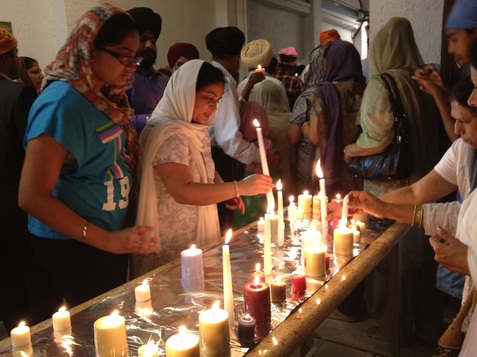| When members of a minority religion with a history of being persecuted are again victimized with baseless hatred and violence, decent people come to stand by their side. That is what I saw in 2003 when the cemetery of the congregation I served was vandalized. Tonight, I tried to do something to return the favor. |
In response, the clergy of every faith group in town came to stand with the Jewish community. They spoke directly to their churches, and to the community at large, with the message that antisemitism would not be tolerated. A blow against one religion, they said, was a blow against all. I was deeply moved by that experience.
Yesterday, in an incident far more grim and far more serious, a man with a semi-automatic handgun entered a Sikh temple in Oak Creek, Wisconsin, with the intention of killing people simply because he saw them as being different. As you know, seven people, including the gunman, were killed.
I attended a vigil tonight at the Sikh Society of Florida to show the solidarity of the Jewish community with our Sikh neighbors. I wanted to let them know that they have friends in the Jewish community. I wanted to pay back a debt I owe to others who did the same for me.
At the vigil, there were passionate speeches that sounded painfully familiar in the ears of a Jew born in the twentieth century. Sikh men and women talked about how their religion's highest ideal is the equality of all human beings. They talked about how ignorance and hatred have combined to turn their peaceful culture and religion into a scapegoat—and not for the first time in their people's difficult history.
They talked about how regrettable it is that the image of a man with a beard and a turban has been transformed in the West into a symbol of evil—instantly associated with the image of Osama bin Laden. Many Americans assume that Sikh men, who are religiously required to wear turbans and beards, are Arab Muslims. Sikhs, of course, are neither Muslims nor Arabs.
They also tried to make sense of the senseless act of a deranged man who took so many innocent lives and left so many families heartbroken. For Sikhs—who, like Jews, are monotheists—this can only lead to questions about how an omnipotent and benevolent God could allow such a thing to happen. There are no answers for such questions.
They talked about those who sacrificed themselves to save others. Satwant Kaleka, the president of the Sikh temple in Wisconsin, was killed when he tried to stop the gunman. He was armed only with a knife. The Sikh community also declares with deep gratitude the heroism of Lt. Brian Murphy, the Oak Creek police officer who came to the aid of the shooting victims and was shot at close range at least eight times. He is now recovering in an area hospital following multiple surgeries.
For me, the deepest surprise about this evening was a mood that was more life-affirming than mournful. Certainly, the Sikh community is horror-stricken by the murders in Wisconsin. Yet, they are a people who greatly value community and the blessing of sharing what they have with others. There was a certain, modest satisfaction in this community that they could come together—and welcome others into their spiritual home—to draw strength from each other in facing a very dark time.
If I came to the Sikh temple tonight thinking that I was paying off an old debt, I left feeling, instead, that I had received a further gift. The Sikh community showed me what my own tradition teaches—that in a time of darkness, we make our own light by sharing ourselves with others.


 RSS Feed
RSS Feed
